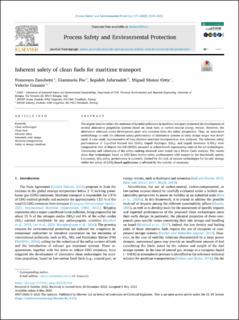| dc.contributor.author | Zanobetti, Francesco | |
| dc.contributor.author | Pio, Gianmaria | |
| dc.contributor.author | Jafarzadeh, Sepideh | |
| dc.contributor.author | Muñoz Ortiz, Miguel | |
| dc.contributor.author | Cozzani, Valerio | |
| dc.date.accessioned | 2024-01-16T10:05:53Z | |
| dc.date.available | 2024-01-16T10:05:53Z | |
| dc.date.created | 2023-05-08T10:36:52Z | |
| dc.date.issued | 2023 | |
| dc.identifier.citation | Process Safety and Environmental Protection (PSEP). 2023, 174, 1044-1055. | en_US |
| dc.identifier.issn | 0957-5820 | |
| dc.identifier.uri | https://hdl.handle.net/11250/3111744 | |
| dc.description.abstract | The urgent need to reduce the emission of harmful pollutants in maritime transport promoted the development of several alternative propulsion systems based on clean fuels or carbon-neutral energy vectors. However, the alternative solutions under development pose new concerns from the safety perspective. Thus, an innovative methodology to rank the inherent safety performance of alternative systems at early design stages was developed. A case study representative of long-distance maritime transportation was analysed. The inherent safety performances of Liquefied Natural Gas (LNG), Liquid Hydrogen (LH2), and Liquid Ammonia (LNH3) were compared to that of Marine Gas Oil (MGO), assumed as a benchmark representing state-of-the-art technologies. Uncertainty and robustness of the safety ranking obtained were tested via a Monte Carlo analysis. The results show that technologies based on LNG have similar safety performances with respect to the benchmark option. Conversely, LH2 safety performance is currently limited by the lack of mature technologies for its safe storage whilst the safety of LNH3-based applications is affected by the toxicity of ammonia. | en_US |
| dc.language.iso | eng | en_US |
| dc.publisher | Elsevier | en_US |
| dc.rights | Navngivelse 4.0 Internasjonal | * |
| dc.rights.uri | http://creativecommons.org/licenses/by/4.0/deed.no | * |
| dc.title | Inherent safety of clean fuels for maritime transport | en_US |
| dc.title.alternative | Inherent safety of clean fuels for maritime transport | en_US |
| dc.type | Peer reviewed | en_US |
| dc.type | Journal article | en_US |
| dc.description.version | publishedVersion | en_US |
| dc.rights.holder | © 2023 The Authors. Published by Elsevier. | en_US |
| dc.source.pagenumber | 1044-1055 | en_US |
| dc.source.volume | 174 | en_US |
| dc.source.journal | Process Safety and Environmental Protection (PSEP) | en_US |
| dc.identifier.doi | 10.1016/j.psep.2023.05.018 | |
| dc.identifier.cristin | 2146078 | |
| cristin.ispublished | true | |
| cristin.fulltext | original | |
| cristin.qualitycode | 1 | |

